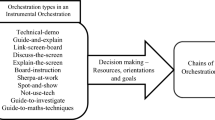Abstract
This paper considers how complex educationalchange may be managed through the `metatask' oforchestration, narrowly distributed amongsenior formal leaders within and betweendifferent administrative levels of large publiceducation systems. Orchestration impliessteering the change process by organising andmaintaining oversight of an intricate array ofcoordinated tasks. It is the over-arching`complex change management theme' of ahierarchically ordered typology derivedinductively from a national study ofdistrict-wide initiatives to close or mergeschools so as to reduce spare student capacityand improve the quality of educationalprovision. The paper explores patterns revealedby this research relating to orchestration. Theresearch design and methods are outlined. Therelationship is clarified between the conceptsof orchestration, leadership and management. Ananalytical model is built-up for analysingcomplex educational change along threedimensions: change management themes, headed byorchestration; characteristics of thecomplexity of the change with managementimplications; and stages of the change process.The constituents of each dimension in turn aredescribed, briefly illustrated throughreference to reorganisation, and linked withorchestration. Characteristics of complexitydictated the response of orchestration and thesubordinate complex change management themesacross the different stages of the changeprocess. The analytical model is offered as aconceptual framework for future research thatwould test its wider applicability and as apractical planning tool. The importance isunderlined of developing generic yetcontext-sensitive practical guidance thatreflects the degree of complexity faced byorchestrators charged with managingcontemporary educational change.
Similar content being viewed by others
REFERENCES
Bass, B. (1985). Leadership and Performance Beyond Expectations. New York: Free Press.
Bennis, W. & Nanus, B. (1985). Leaders: The Strategies for Taking Charge. New York: Harper & Row.
Bolman, L. & Deal, T. (1991). Reframing Organisations: Artistry, Choice and Leadership. San Francisco: Jossey-Bass.
Day, C., Harris, A., Hadfield, M., Tolley, H. & Beresford, J. (2000). Leading Schools in Times of Change. Buckingham: Open University Press.
Encarta (2001). Encarta Concise English Dictionary. London: Bloomsbury.
Fullan, M. (2001a). Leading in a Culture of Change. San Francisco: Jossey-Bass.
Fullan, M. (2001b). The New Meaning of Educational Change, 3rd edn. London: Cassell.
Gronn, P. (2000). Distributed properties: A new architecture for leadership. Educational Management and Administration 28(3), 317-338.
Hargreaves, A. (1983). The politics of administrative convenience: The case of middle schools. In J. Ahier & M. Flude (eds), Contemporary Education Policy. London: Croom Helm.
Leithwood, K., Jantzi, D. & Steinbach, R. (1999). Changing Leadership for Changing Times. Buckingham: Open University Press.
Louis, K.S. & Miles, M. (1990). Improving the Urban High School: What Works and Why. New York: Teachers College Press.
MacBeath, J. (ed) (1998). Effective School Leadership: Responding to Change. London: Paul Chapman.
Merriam, S. (1997). Qualitative Research and Case Study Applications. London: Jossey-Bass.
Miles, M. & Huberman, M. (1994). Qualitative Data Analysis, 2nd edn. London: Sage.
Southworth, G. (1998). Leading Improving Primary Schools: The Work of Headteachers and deputy Heads. London: Falmer Press.
Starratt, R. (1995). Leaders with Vision: The Quest for School Renewal. Thousand Oaks, CA: Corwin Press.
Teacher Training Agency (1998). National Standards for Headteachers. London: TTA.
Wallace, M. (1996a). A crisis of identity: School merger and cultural transition. British Educational Research Journal 22(4) 459-472.
Wallace, M. (1996b). Policy interaction and policy implementation: A case of school merger under duress. Educational Management and Administration 24(3) 263-275.
Wallace, M. (2000). Integrating cultural and political theoretical perspectives: The case of school restructuring in England. Educational Administration Quarterly 36(4) 608-632.
Wallace, M. & Hall, V. (1994). Inside the SMT: Teamwork in Secondary School Management. London: Paul Chapman.
Wallace, M. & Huckman, L. (1999) Senior Management Teams in Primary Schools: The Quest for Synergy. London: Routledge.
Wallace, M. & McMahon, A. (1994). Planning for Change in Turbulent Times: The Case of Multiracial Primary Schools. London: Cassell.
Wallace, M. & Pocklington, K. (1998). Realising the potential of large-scale reorganisation for promoting school improvement. Educational Management and Administration 26(3) 229-241.
Wallace, M. & Pocklington, K. (2002). Managing Complex Educational Change: Large-Scale Reorganisation of Schools. London: RoutledgeFalmer.
Author information
Authors and Affiliations
Rights and permissions
About this article
Cite this article
Wallace, M. Orchestrating Complex Educational Change: Local Reorganisation of Schools in England. Journal of Educational Change 5, 57–78 (2004). https://doi.org/10.1023/B:JEDU.0000022844.50126.2f
Issue Date:
DOI: https://doi.org/10.1023/B:JEDU.0000022844.50126.2f




